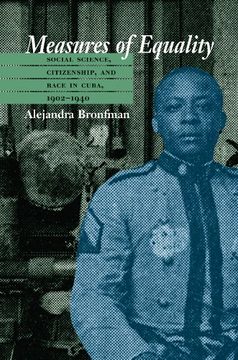Compartir
Measures of Equality: Social Science, Citizenship, and Race in Cuba, 1902-1940 (Envisioning Cuba) (en Inglés)
Alejandra M. Bronfman (Autor)
·
The University Of North Carolina Press
· Tapa Blanda
Measures of Equality: Social Science, Citizenship, and Race in Cuba, 1902-1940 (Envisioning Cuba) (en Inglés) - Alejandra M. Bronfman
$ 11.960
$ 14.070
Ahorras: $ 2.110
Elige la lista en la que quieres agregar tu producto o crea una nueva lista
✓ Producto agregado correctamente a la lista de deseos.
Ir a Mis ListasRecíbelo
Hoy mismo, comprando antes de
10 horas y 30 minutos.
En la mayoría de las comunas de la provincia de Santiago*
* A excepción de las comunas de San Ramón, Lo Espejo y La Pintana
* Tu pedido será despachado después de las 14:00 hrs.
Lo recibirás Mañana.*
* RM: (Gran Santiago).
* VIII Región: Concepción, San Pedro de la Paz, Talcahuano, Hualpén y Chiguayante.
* V Región: Valparaíso, Viña del Mar, Quillota, Calera, La Cruz, Limache, Quilpué, Villa Alemana.
* IX Región: Temuco y Padre de las Casas.
* Resto de Chile: Un día hábil después.
Reseña del libro "Measures of Equality: Social Science, Citizenship, and Race in Cuba, 1902-1940 (Envisioning Cuba) (en Inglés)"
In the years following Cuba's independence, nationalists aimed to transcend racial categories in order to create a unified polity, yet racial and cultural heterogeneity posed continual challenges to these liberal notions of citizenship. Alejandra Bronfman traces the formation of Cuba's multiracial legal and political order in the early Republic by exploring the responses of social scientists, such as Fernando Ortiz and Israel Castellanos, and black and mulatto activists, including Gustavo Urrutia and Nicolas Guillen, to the paradoxes of modern nationhood.Law, science, and the social sciences--which, during this era, enjoyed growing status in Cuba as well as in many other countries--played central roles in producing knowledge and shaping social categories in postindependence Cuba. Anthropologists, criminologists, and eugenicists embarked on projects intended to employ the tools of science to rid Cuba of the last vestiges of a colonial past. Meanwhile, the legal arena created both new freedoms and new modes of repression. Black and mulatto intellectuals and activists, working to ensure that citizenship offered concrete advantages rather than empty promises, appropriated changing social scientific and legal categories and turned them to their own uses. In the midst of several decades of intermittent racial violence and expanding social and political mobilization by Cubans of African descent, debates among intellectuals and activists, state officials, and legislators transformed not only understandings of race, but also the terms of citizenship for all Cubans.

